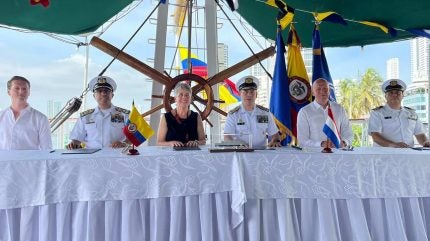
Colombia is set to become the third Latin American country capable of constructing naval vessels domestically, following the signing of a contract between COTECMAR and Damen Shipyards.
The construction of the Plataforma Estratégica de Superficie (PES) frigate is poised to bolster Colombia’s naval capabilities while driving technological advancement and local industry growth.
Colombia joins regional naval powers with frigate construction deal
Colombia has embarked on a journey toward maritime self-reliance as its first domestically built frigate project begins. The contract, signed by the Corporación de Ciencia y Tecnología para el Desarrollo de la Industria Naval, Marítima y Fluvial (COTECMAR) and the Dutch Damen Shipyards Group, marks a milestone in the nation’s naval history.
The new vessel, the Plataforma Estratégica de Superficie (PES), will be constructed at COTECMAR’s facilities in Cartagena, following Damen’s SIGMA 10514 design. The PES will span 107.5 metres (m) in length with a 14.02m beam, positioning Colombia alongside Mexico and Brazil as one of the few Latin American countries capable of producing such naval platforms.
According to GlobalData’s global naval vessels and surface combatants market intelligence, Colombia is anticipated to lead the market in the region with its frigate and logistic support vessel procurements, undertaken as part of its initiative to build a naval fleet of 100 vessels before 2042.
By enhancing its naval capabilities with locally built vessels, Colombia is strengthening its defence infrastructure and asserting its sovereignty in regional maritime affairs.
Colombia is increasing its defence spending, projected to reach $18bn by 2029, to address rising security threats from border disputes. The country’s defence market is set to grow at a 7% CAGR, with investments in naval vessels, military aircraft, and land vehicles.
Colombia’s first domestically built frigate
The Colombian Ministry of Defense anticipates these frigates will provide enhanced protection during anti-submarine warfare, with enhanced self-defence and commando-projection capacities, per GlobalData’s “Colombia Defense Market 2024-2029” report.
The collaboration also serves as a catalyst for the country’s burgeoning maritime industry. The construction of the PES is expected to drive local employment, spur technological development, and foster specialised skills in naval engineering—an investment promising long-term economic and strategic benefits for Colombia.
Vice Admiral Juan Ricardo Rozo Obregón, Commander of the Colombian Navy, hailed the event as a “historic day,” underlining the project’s significance for national security and industry. The sentiment was echoed by COTECMAR President Vice Admiral Luis Fernando Márquez Velosa and Damen Naval Managing Director Roland Briene, who highlighted the partnership between their organisations as a promising sign of the project’s future success.
The PES project follows the recent cooperation between COTECMAR and Damen on the oceanographic and arctic research vessel Simón Bolívar, further solidifying the bond between the Colombian and Dutch naval industries. This continuity in collaboration suggests an alignment beyond individual projects, aiming for a sustained enhancement of Colombia’s naval capabilities.
As construction begins, the PES frigate symbolises more than just a new addition to the Colombian Navy’s fleet—it represents a step towards national self-sufficiency in defence production and progress in the evolution of Colombia’s maritime industry. Completing this project will bolster Colombia’s naval defences but could also pave the way for further advancements in the country’s strategic sectors, marking Colombia as a player in the regional maritime landscape.




